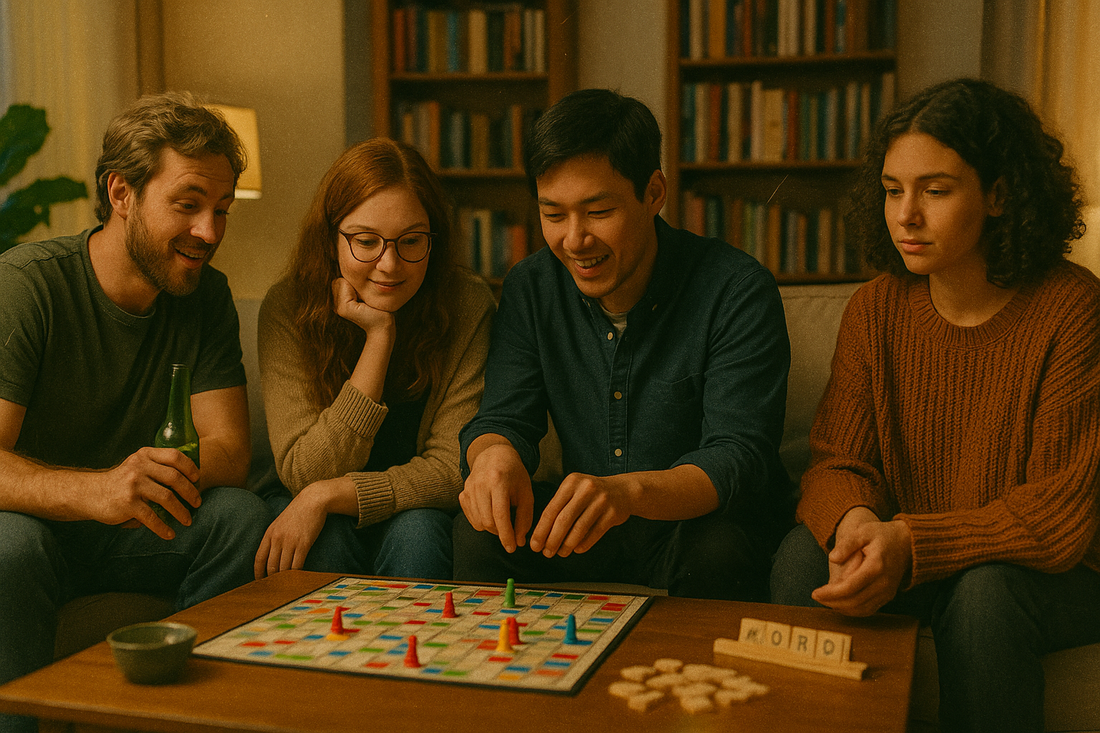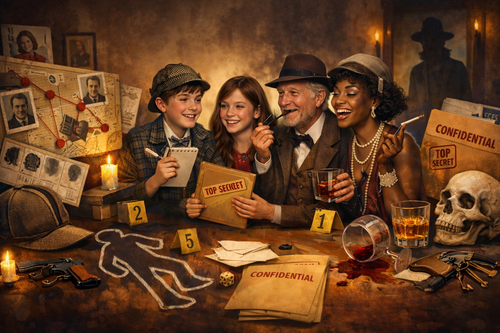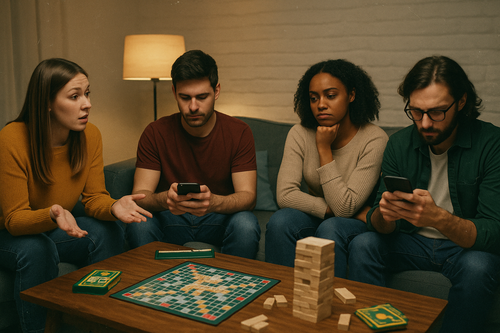
The Secret Psychology of Getting Introverts to Love Game Night
Share
The Secret Psychology of Getting Introverts to Love Game Night
Here's something nobody talks about: the people who claim they "hate game nights" are often the ones who end up being the best at mystery games. I'm talking about your friend who sits quietly at parties but notices everything. The one who remembers details from conversations six months ago. The person who always knows exactly who's lying in movies before the big reveal.
Yeah, that friend. They're not antisocial. They're not boring. They're just wired differently, and most party games are designed for their complete opposite.
But mystery games? Mystery games are basically designed for the introvert brain. And once you understand why, you'll never plan another gathering the same way.
The Introvert Advantage (It's Real Science)
Let's start with what introverts actually are, because most people get this wrong. It's not about being shy or antisocial. Introverts process information differently. They literally think before they speak, while extroverts think by speaking.
In most party situations, this puts introverts at a massive disadvantage. Charades? You have to perform immediately. Trivia? First person to shout gets the point. Most party games reward quick reactions and loud personalities.
But solving mysteries? That rewards exactly what introverts are naturally good at:
- Careful observation
- Pattern recognition
- Deep thinking about connections
- Remembering small details
- Analyzing motives and psychology
I watched this play out perfectly last month. My friend Rachel usually spends parties on the edges of conversations, jumping in occasionally but mostly observing. But during Fatal Secrets, she was the one connecting clues everyone else missed. She noticed that two characters' stories didn't match up, caught a timeline inconsistency, and basically solved the whole thing while the extroverts were still dramatically accusing each other.
The best part? She loved it. Not just the solving part, but the whole experience. Because for once, the game was built for how her brain actually works.
Creating Psychological Safety (The Foundation of Everything)
Here's where most hosts mess up: they assume everyone wants to be the center of attention. But introverts don't want to disappear entirely. They want to participate meaningfully without feeling like they're performing.
The Character Shield Effect: This is huge. When you're playing a character, you're not being judged as yourself. You're playing a role. Haunted Mansion is brilliant for this because the characters are so clearly defined that shy people can hide behind them. Suddenly the quiet person is passionately defending their character's innocence, and they're not worried about being judged because it's not really them talking.
The Preparation Advantage: Introverts love games where they can think ahead. Send character descriptions a week early, and watch what happens. They'll show up with backstories, costume details, and theories about other characters. They've been mentally preparing, which means they feel confident instead of anxious.
Residuum takes this even further. It's not just a mystery to solve; it's a whole world to explore. The setting gives introverts permission to be analytical and methodical. They can dig deep into the technology aspects, theorize about the implications, and really sink their teeth into complex problem-solving. Plus, the digital format means they can process information at their own pace.
The Small Group Sweet Spot: Four to six people is perfect. Big enough for interesting dynamics, small enough that everyone's voice matters. In a group of twelve, introverts get lost. In a group of four, they can't hide, but they also can't be ignored.
The Power of Preparation (Why Introverts Love Rules)
Extroverts can wing it. They're comfortable with chaos and making things up as they go. Introverts prefer structure, and there's nothing wrong with that. It's not about being controlling; it's about feeling secure enough to be creative.
Clear Rules = Creative Freedom: When introverts know exactly how the game works, they can focus on strategy instead of worrying about doing something wrong. Post // Mortem excels here because it's methodical. There are clear steps, logical progressions, and no surprise rule changes.
The Research Phase: Give introverts something to study, and they'll come prepared to dominate. The Last Will of Jed Manhattan has rich character backgrounds and complex family dynamics. Introverts will read every word, make notes, and show up with theories. They're not being nerdy; they're playing to their strengths.
Timing Control: Games with built-in thinking time are perfect. The Enchanted Forest lets people work through puzzles at their own pace before sharing solutions. No pressure to blurt out the first thing that comes to mind.
Energy Management (The Secret Nobody Talks About)
Here's something most extroverts don't realize: social energy is finite for introverts. They can be completely engaged and having a blast, but they're also using up their social battery. Smart hosts plan for this.
The Quiet Moments: Build in natural breaks where people can recharge. Investigation phases where everyone's reading clues silently. Evidence review time where people can think without talking. These aren't dead moments; they're essential rest periods.
Optional Participation: Some rounds, let people choose whether to share their theories out loud or write them down. Residuum handles this beautifully because players can contribute through different methods. Some people want to present their findings dramatically. Others prefer to submit detailed written analyses. Both contributions are equally valuable.
The Exit Ramp: Always have a graceful way for people to step back without feeling like they're ruining the game. "Feel free to just observe this round if you want" isn't exclusion; it's inclusion with options.
Small Group Dynamics (Why Bigger Isn't Better)
Every time someone suggests inviting more people to game night, a little part of me dies. More people does not equal more fun. It equals more chaos, more talking over each other, and more introverts checking out.
The Goldilocks Zone: Six people is perfect for most mystery games. Everyone has a meaningful role, but no one person can dominate the conversation. Fatal Secrets is designed exactly for this sweet spot.
Role Distribution: In smaller groups, introverts naturally find their niche. Maybe they become the evidence keeper. Maybe they're the timeline tracker. Maybe they're the one everyone goes to when they need to remember what happened three clues ago. These roles let them contribute without performing.
The Amplification Effect: In big groups, loud people get louder and quiet people get quieter. In small groups, everyone's voice matters. I've seen introverts become the most dramatic accusers in games of six, but completely disappear in games of ten.
Reading the Room (Advanced Host Skills)
Once you understand introvert psychology, you start noticing things other hosts miss. Like when someone's getting overwhelmed but trying to push through. Or when they're genuinely excited but expressing it quietly.
The Processing Signs:
- Long pauses before answering (they're thinking, not confused)
- Asking for clarification (they want to participate correctly)
- Taking notes (they're engaged, not bored)
- Quiet "hmm" sounds (they're making connections)
Energy Level Monitoring: Watch for the point where someone shifts from engaged-quiet to tired-quiet. Engaged-quiet looks focused and alert. Tired-quiet looks distant and checking out. When you spot tired-quiet, it's break time.
The Breakthrough Moment: You'll know you've nailed it when the introvert starts volunteering information without being asked. When they interrupt someone else's theory with their own. When they get visibly excited about a clue connection. This is introvert engagement, and it's beautiful to watch.
The Science Behind Why Mystery Games Work for Shy People
There's actual research on this. Introverts excel at:
- Detail-oriented tasks (finding hidden clues)
- Pattern recognition (connecting seemingly unrelated information)
- Deep processing (thinking through implications and motives)
- Written communication (many mystery games include written elements)
- One-on-one or small group interactions (exactly what investigation phases create)
The Flow State Connection: Introverts achieve flow states more easily in structured environments. Mystery games provide clear objectives, manageable challenges, and immediate feedback. When an introvert gets into flow during a game, they become unstoppable.
Residuum particularly excels at creating flow states because it combines logical problem-solving with imaginative world-building. The elements give analytical minds something concrete to work with, while the mystery elements provide that satisfying "aha!" moment payoff.
Character Assignment Strategies (The Host's Secret Weapon)
This is where you can make or break an introvert's experience. Character assignment isn't random; it's strategic.
For the Analytical Introvert: Give them the detective, the scientist, or the investigator character. Someone whose job it is to ask questions and piece things together. Residuum has particularly great analytical characters because they get to explore technology and solve technical puzzles.
For the Observant Introvert: Make them the witness, the assistant, or the record-keeper. Someone who notices details others miss. This plays to their natural strengths.
For the Creative Introvert: Give them a character with interesting secrets or complex motivations. They'll develop rich internal narratives that enhance everyone's experience.
The Secret Weapon: Pair introverts with complementary extroverts as investigation partners. The extrovert handles the social interrogation; the introvert handles the detail analysis. It's like buddy cop movies, but for party games.
Building Confidence (From Wallflower to Detective)
The transformation is real. I've watched people who barely speak at regular parties become passionate advocates for their theories during mystery games. But it doesn't happen by accident.
Start Small: Begin with shorter games or free options like Mystery of the Blue Dress. Let them experience success without a big time commitment.
Celebrate Different Contributions: When someone quietly figures out a crucial clue, make sure everyone knows. "Wait, how did you catch that detail the rest of us missed?" This kind of recognition builds confidence.
The Repeat Effect: Introverts often get better at each game. They learn the rhythm, understand the expectations, and start taking bigger social risks. By the third mystery game, that quiet observer might be dramatically pointing accusations across the room.
Your Inclusive Game Night Action Plan
Ready to create game nights where everyone thrives? Here's your step-by-step approach:
Before the Game:
- Send character descriptions early
- Explain the rules clearly in your invitation
- Keep the group size at 4-6 people
- Set expectations about participation (everyone contributes, no one has to perform)
During the Game:
- Build in quiet thinking time
- Celebrate different types of contributions
- Watch for energy levels and call breaks when needed
- Let people participate in their preferred style
After the Game:
- Do a debrief where everyone shares their favorite moment
- Ask what they figured out and when
- Plan the next game based on what worked
Game Selection Strategy:
- For first-timers: Start with Fatal Secrets (clear structure, engaging characters)
- For analytical types: Try Residuum (complex world-building, technical elements)
- For creative types: Go with Haunted Mansion (rich role-playing opportunities)
- For mixed groups: The Last Will of Jed Manhattan works for everyone
The Ripple Effect
Here's what happens when you nail inclusive game night hosting: word spreads. Introverts have their own networks, and they talk to each other. When someone has a genuinely great time at a social event (rare for many introverts), they tell their introvert friends.
Suddenly you become known as someone who throws gatherings where everyone actually has fun. Where personality types don't matter. Where people leave feeling energized instead of drained.
And honestly? Once you see an introvert in their element during a mystery game, solving puzzles and making connections and getting genuinely excited about plot twists, you'll never want to host a regular party again.
The quiet ones have been waiting for games designed for their brains. Residuum and our other mystery games are exactly that. Ready to help everyone at your table shine?
Browse our complete collection and discover why the best detectives are often the ones who observe everything and say the least.






